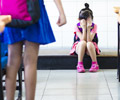Britons are the most protective parents in the world, says a new report, which found that English people don't let their children roam much further than their front gardens.
Britons are the most protective parents in the world, says a new report, which found that English people don't let their children roam much further than their front gardens.
The study found that a fifth of mommies in the UK wanted to supervise their child's every move, not allowing them far from home on their own.But experts have called such a behaviour bad for the child's growth, as by being over-protective, parents could be damaging their children and depriving them of the carefree upbringing young people enjoyed in the past.
The research compared studies carried out on parental attitudes to children's freedom in ten countries around the world.
In the UK, 19 per cent of mothers said they wanted to supervise their children's activities. This was despite the fact that 64 per cent of parents believed that children were deprived of childhood.
Compared with the UK, other countries had more relaxed attitudes to children playing unsupervised.
In Argentina 18 per cent of mothers said they wanted to watch over what their children were doing, followed by the United States (15 per cent), South Africa (14 per cent), France (10 per cent), China (8 per cent), Brazil (7 per cent), Thailand (6 per cent) Turkey (5 per cent), and India (4 per cent).
Advertisement
"If we can increase play in childhood years, we can help increase emotional development and social skills needed for later on in life," the Scotsman quoted Kris Murrin, a child behavioural expert, as saying.
Advertisement
Source-ANI
SRM









